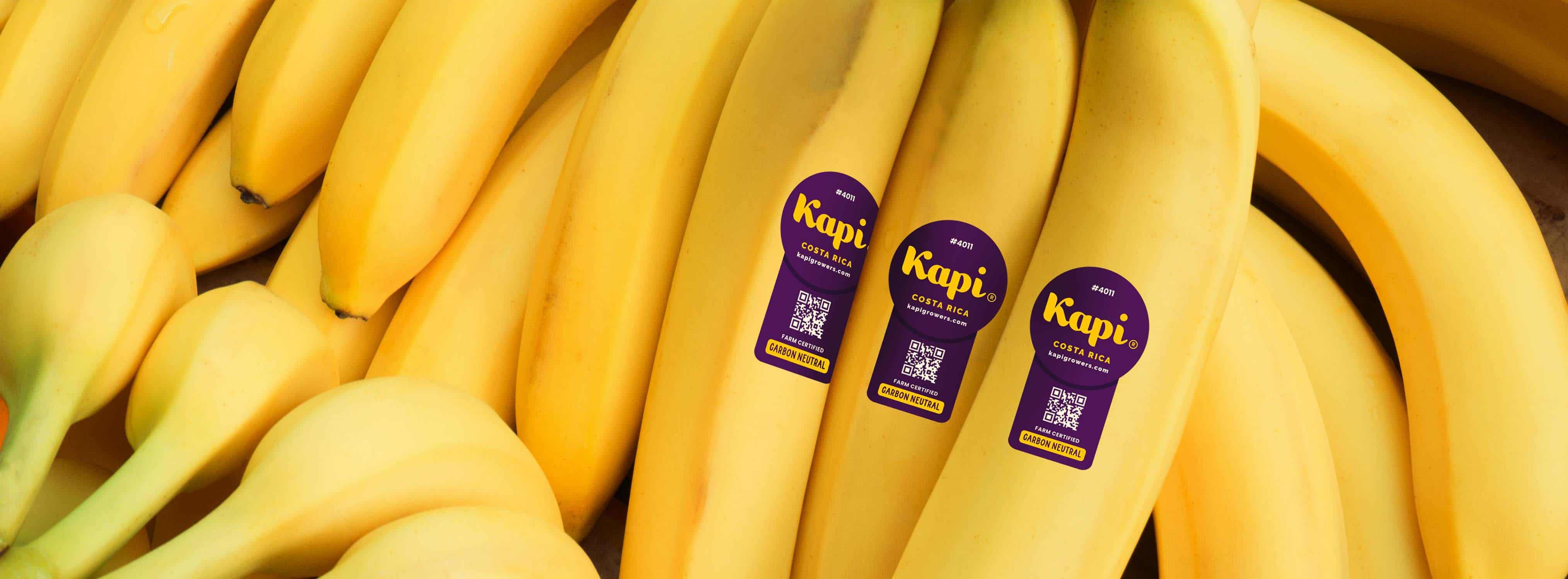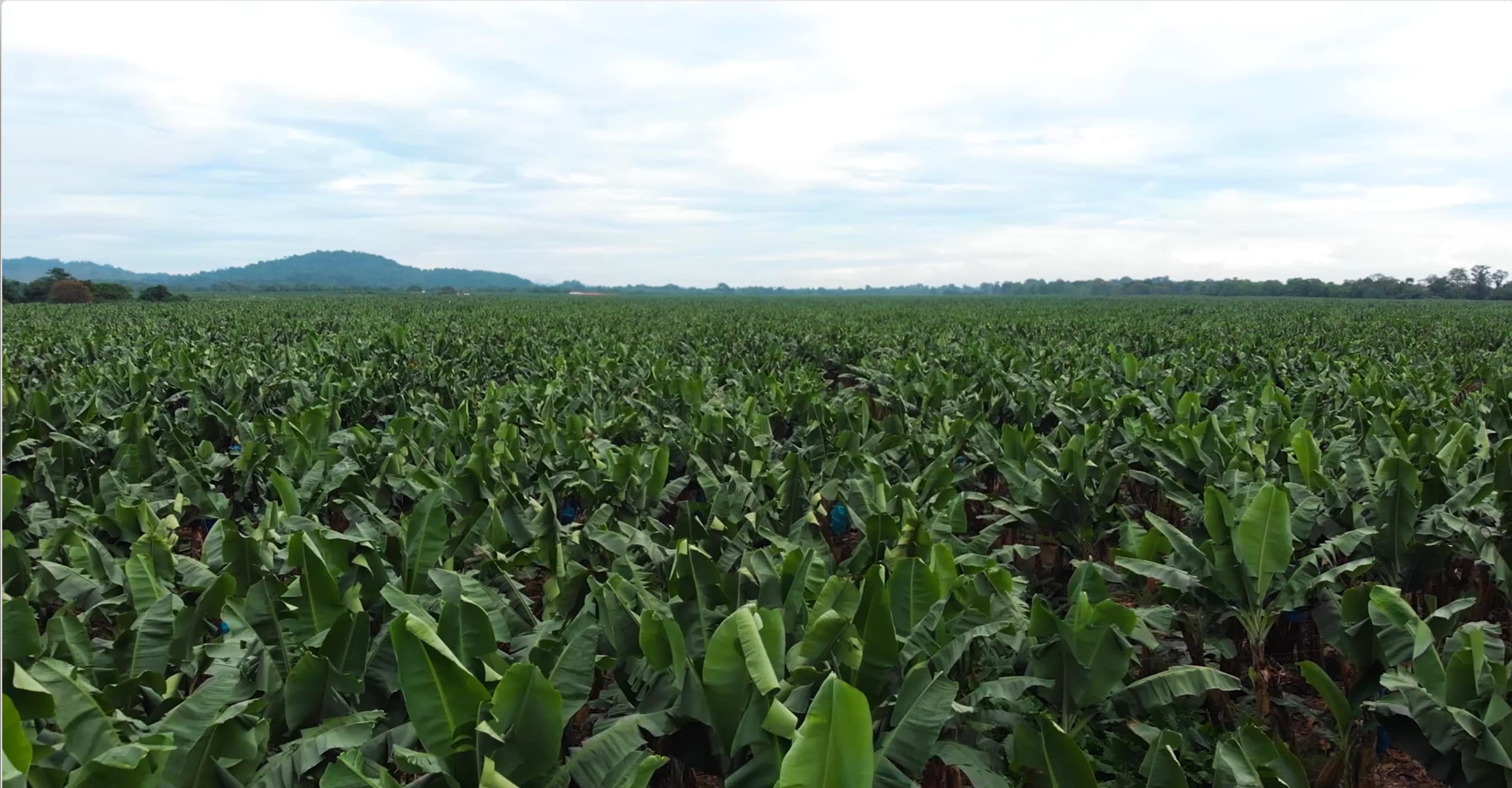As the amount of atmospheric carbon rises, the fight against climate change becomes increasingly important. Kapi Kapi Growers, a tropical fruit grower, exporter and distributor, acknowledges the significance of reducing carbon emissions and has successfully achieved carbon neutrality in its banana division.
Founded in Costa Rica, with headquarters in the US, Kapi Kapi Growers has been growing tropical fruit since 1987. The company is a major supplier of premium bananas and pineapples to the world’s largest retailers and multi-national tropical fruit brands in over 25 countries. Food safety and sustainability are core values of Kapi Kapi Growers. Its efforts have been recognized through various national awards and global certifications such as Sustainably Grown Certified, Rainforest Alliance and Ethical Trading Initiative. As of 2022, it is the only grower in Costa Rica with multiple farm locations that has achieved carbon neutrality for 100% of its banana operation. The company is also leading the way to pursuing in the next years, a carbon neutral certification for pineapples.
UN Sustainability
Development Goals:
2 – Zero Hunger
3 – Good Health & Well Being
4 – Quality Education
5 – Gender Equality
7 – Affordable & Clean Energy
8 – Decent Work & Economic Growth
9 – Industry, Innovation & Infrastructure
15 – Life on Land
Kapi Kapi exported its first banana in 1989 and in 2009, had its first direct sale to a European retailer. Since then, the company has grown dramatically in the global market. The company aligns its mission, values, and business practices with broader goals that prioritize sustainability, community well-being, and responsible resource management.
Kapi Kapi strives to set an example to influence change within the produce industry. Sofia Acon, director at Kapi Kapi Growers says, “We want to work toward change in the direction of even higher levels of sustainable production. This certification alone took 5 years of planning and long-term conviction. For us sustainability is at the core of our bigger purpose as we grow”.
The challenge: Addressing the carbon sources
Excess amounts of carbon released into the atmosphere during industry operations is not only a problem in the produce industry, but in all industries around the world. As the detrimental effects of climate change persist, it is imperative that industry leaders find ways to counteract these problems. Companies like Kapi Kapi have started to subscribe to sustainability initiatives like carbon neutrality, which exhibit mindfulness for atmospheric carbon production. Carbon neutrality is not easy to achieve; it takes careful planning and analysis. There is a challenge in keeping track of main carbon contributors like nitrogen-based fertilizers, fuels, machinery and transportation.
 Nitrogen-based fertilizers can increase atmospheric carbon through a variety of processes — production being a major one. Synthetic fertilizers, such as nitrogen-based fertilizers, require the use of fossil fuels. Ammonia, an important component of nitrogen-based fertilizers, uses natural gas as a feedstock for its production. Any process that involves the movement, development or extraction of natural gas will subsequently release carbon into the atmosphere.
Nitrogen-based fertilizers can increase atmospheric carbon through a variety of processes — production being a major one. Synthetic fertilizers, such as nitrogen-based fertilizers, require the use of fossil fuels. Ammonia, an important component of nitrogen-based fertilizers, uses natural gas as a feedstock for its production. Any process that involves the movement, development or extraction of natural gas will subsequently release carbon into the atmosphere.
Improper management of soils can also increase atmospheric carbon levels. Poor application techniques and excessive fertilizer use can result in leaching and nutrient runoff. When fertilizers enter stationary or moving bodies of water, eutrophication and other detrimental processes can occur. The degradation of water quality results in the release of methane, a greenhouse gas.
Advancements in technology have caused many agricultural companies to rely on machinery for certain agricultural processes. Technologies such as ATVs (Advanced Technology Vehicles), combine harvesters and tractors require the use of fuel, which releases carbon into the atmosphere upon use. The amount of carbon released by these machines depends on a variety of factors including fuel type, use duration and machine operating conditions.
Soil compaction caused by heavy machinery can also contribute to increased atmospheric carbon levels. The compaction of soil leads to decreased pore space and, as a result, decreased oxygen levels. This creates anaerobic conditions in the soil. During anaerobic conditions, organic matter is broken down in a way that produces methane.
Transportation should be considered as well. Whether by truck, ship or plane, when produce is transported, carbon is released into the atmosphere. The amounts depend on the mode of transportation, type of fuel and the distance of transportation.
Deforestation is another contributing factor to carbon emissions. Forests are huge carbon sinks, containing large amounts of carbon. When cut down, this carbon is released into the atmosphere. Globally, approximately 6 million hectares of forest are lost each year due to deforestation. Additional effects of deforestation beyond increased greenhouse gases are soil erosion, desertification and loss of biodiversity. Protecting wildlife, pollinators and land can be challenging with the ever-expansive nature of our economy but, given the environmental pressures of climate change and global warming, it is more important than ever to keep forests protected. The challenge lies in accounting for and counterbalancing any of these sources of carbon emissions.
The challenge lies in accounting for and counterbalancing these sources of carbon emissions.

The solution: Managing emissions step by step
Carbon neutrality involves a company compensating for its carbon emissions through environmentally beneficial countermeasures. A carbon neutral certification ensures the reduction and offsetting of all carbon emissions generated by the farming operations of Kapi Kapi. The certification process for the banana division, with an area of approximately 9,000 hectares, began in 2017.
Kapi Kapi opted for recognition by Costa Rica's National Carbon Neutrality Program issued by the Climate Change Department of the Ministry of Environment and Energy, allowing them to call themselves a carbon neutral company.
The certification process included ten main steps:
- defining the scope of the inventory
- studying regulations and literature on GHG emissions during production
- meeting with staff to review production processes and identify all GHG emissions generation in the operation
- classifying each emission source
- preparing GHG emissions inventory
- developing a management system
- developing and implementing reduction plan
- offset remaining emissions
- measuring emissions, documenting fand reporting
- certification, communication and ongoing monitoring.
To reach its goal of carbon neutrality, Kapi Kapi began by identifying its main carbon generators. During this year-long process, Kapi Kapi selected a verified auditing entity and proceeded to gather data pertaining to the operation’s total carbon emissions. Main sources of carbon for the company include fertilizers, machinery and transportation. All sources of carbon emissions were identified, quantified and accounted for. Once identified, the company enacted a plan that included establishing a carbon neutrality management system and implementing reduction measures, which included solar panels installation.

Solar panels are technologies that use the sun’s UV rays as a source of energy. The panels source power from the sun, a renewable energy source, decreasing the reliance on fossil fuels. While the use of fossil fuels may require less effort because energy from the grid is easily accessible and solar energy requires expansive solar panel installations and consistent sunlight.
According to Acon, “9000 solar panels would cover all of our operations. This is now the primary source of our energy.” The solar panels take an area of more than 182,000 square feet and is one of the largest solar panel operations in Costa Rica.
Protecting forests is also pertinent in compensating for carbon emissions. With this initiative, Kapi Kapi measured its total acreage of protected forests. Because trees sequester carbon, the more forests in proximity to its operations, the less carbon will be released into the atmosphere.
As a final step in achieving carbon neutrality, Kapi Kapi prepared a Greenhouse Gases Report and submitted it to be verified and audited. In December 2020, Kapi Kapi received full carbon neutrality certification.
The takeaway: Sustainability is our future
It is crucial that companies begin adopting sustainability initiatives like Kapi Kapi Grower’s goal of carbon neutrality, et al. Global warming and climate change are real issues and when industry leaders join efforts in addressing them, powerful change is possible. Setting an example of environmental responsibility is a compelling way to make an impact. As the human population grows and the demand for food and resources increases, the significance of this only becomes greater.
Kapi Kapi has established itself as a leader and champion for sustainability and a catalyst for change. According to Acon, “We believe a multi-stakeholder approach toward sustainability will help us make better and more efficient progress. Our company is aiming at raising awareness and leading by example within the industry to collaborate with all of those interested in working together toward this goal.” As a result of the carbon neutrality initiative, Kapi Kapi has saved approximately $400k in energy as of 2022. In around 10 years, the company is estimated to have $4 million in energy savings. Around 3,300,000 kWh of clean energy is provided by the solar panels to the grid.
Carbon neutrality is not the only way, nor the only answer to increasing sustainability. Kapi Kapi has taken on other initiatives including job creation, education, healthcare, and supporting local economies. One of the programs, Kapi supports is “Education for Future Generations”. This program has the goal expand students' knowledge, foster literacy and creating a brighter future for the community as a whole. Every year, the number of schools reached by Kapi Kapi’s initiative increases. As of 2022, 32 educational centers have been benefited, with a total of 17,172 books for 4,293 students from the I and II cycle.
Kapi Kapi’s passion for sustainability and commitment to waste reduction inspired its initiative to recycle 100% of the plastics it uses. To further the initiative’s efficiency, the company built a recycling facility on premises, which has resulted in the ability to recycle a total of 3.5 tons of plastic per year.
By acknowledging the significance of reducing carbon emission, Kapi Kapi has set a remarkable example in being an environmentally responsible company. Its work is not done, and it continues to find ways to reduce and compensate for its carbon emissions as an angle to create a more sustainable, inclusive, and resilient agricultural sector.
“How we grow our food today — from how we choose the seeds we plant, to how we build our teams, to how we foster innovation to take care of our communities and our planet, — nurtures tomorrow.” – Kapi Kapi Growers